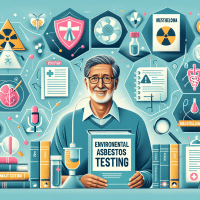Asbestos Environmental Regulations & Mesothelioma Care
Hello, I’m a registered nurse with over 10 years of experience in oncology, and I’ve seen firsthand the challenges faced by those dealing with Mesothelioma. My mission is to offer compassionate guidance as you navigate not only the complexities of asbestos environmental regulations but also the emotional and practical aspects of Mesothelioma care. On this journey, I want you to know that you are never alone, and every step we take is supported by empathy, accurate information, and a genuine desire to help.

Understanding Mesothelioma and Asbestos Exposure
Mesothelioma is a rare and aggressive cancer often linked to asbestos exposure. Asbestos, a once-common construction material, poses significant risks when its fibers are inhaled or ingested. Over time, these fibers can lead to cellular damage and the development of cancers such as Mesothelioma. In my years of experience, I have seen how understanding environmental regulations related to asbestos can empower patients and families to take proactive steps in safeguarding health and seeking proper care.
I believe in a holistic approach that blends medical insight with heartfelt support. It’s vital to understand that asbestos environmental regulations are not just bureaucratic guidelines but tools that ensure safer environments and help prevent further exposure. Institutions like the National Cancer Institute and the American Cancer Society provide comprehensive information about the risks and necessary safety measures.
A supportive community is shown, symbolizing hope and shared strength.
Diagnosis, Biopsies, and the Mesothelioma Staging Process
When faced with a potential Mesothelioma diagnosis, the journey begins with clear, sensitive, and thorough diagnostic steps. I’ve witnessed the anxiety that comes with waiting for biopsy results. Common biopsy techniques include:
- Thoracoscopy: A procedure that allows doctors to visually inspect the pleural space and obtain tissue samples.
- Thoracentesis: Involving the removal of fluid from the pleural cavity, this method aids in diagnosis and helps relieve symptoms.
It is also important to understand the Mesothelioma staging system, typically classified into four stages. To help clarify, here is a simple table that outlines what each stage often means:
| Stage | Description | Treatment Implications |
|---|---|---|
| Stage 1 | Localized cancer, limited to the lining of the lung. | Potential for aggressive treatment with surgery and localized therapy. |
| Stage 2 | Cancer begins to spread within the chest. | Combination of surgery, chemotherapy, and radiation may be considered. |
| Stage 3 | Greater spread within the chest, possibly to nearby organs. | Primarily palliative care combined with chemotherapy or radiotherapy. |
| Stage 4 | Advanced stage with distant metastasis. | Focus on palliative treatments to maintain quality of life. |
Please remember that these stages are guidelines; individual diagnosis and treatment decisions are made on a case-by-case basis with your medical team. (Information on treatment guidelines current as of May 2025)
Navigating Treatment Options and Emotional Challenges
The path ahead may feel overwhelming, but through informed choices and emotional support, there is hope. Treatment options for Mesothelioma aren’t one-size-fits-all. They can include surgery, chemotherapy, radiation, and in some advanced cases, immunotherapy. Each treatment is carefully considered based on stage, overall health, and personal circumstances.
I have seen patients transform their journey when they pair sound medical decisions with strategies for emotional well-being. It is not uncommon for patients to experience anxiety, fear, and grief about their diagnosis. In these moments, open communication with healthcare professionals and loved ones is crucial. I encourage you to ask questions and reach out to support groups where you can share your experiences.
This image represents resilience and the shared strength of a caring community.
Coping Strategies and Emotional Support: From My Heart to Yours
As someone who has walked alongside many patients and families, I know that managing the emotional toll of Mesothelioma is as important as treating the physical aspects of the disease. Here are some specific strategies that have helped me and those I care for:
- Mindfulness and Relaxation Techniques: Practices like meditation can help ease anxiety. Even just a few minutes a day can offer a moment of peace.
- Counseling and Support Groups: Joining a support group or speaking with a therapist specialized in oncology can provide emotional relief and practical coping mechanisms.
- Healthy Communication: Sharing your feelings with trusted family members or friends can lead to genuine, healing conversations.
- Self-Care Routines: Simple but powerful routines such as walks in nature or engaging in your favorite hobby can offer a break from the constant stress of treatment.
I invite you to consider these measures as part of your holistic care plan. In addition, here is a Printable List of Questions for Your Doctor that you might find helpful during your consultations:
- What are the risks and benefits of the recommended treatment?
- How will my overall health influence my treatment options?
- Are there clinical trials or new therapies available for my condition?
- What support services are available for managing side effects and emotional distress?
- How often should I schedule follow-up appointments?
This list is meant to empower you to have open, informative discussions with your healthcare team. Remember, these questions are just a starting point for a collaborative conversation focused on your unique needs.
Next Steps and Resources for a Hopeful Journey
If you are facing the challenges of Mesothelioma and concerned about asbestos environmental regulations, here are some clear next steps and resources to consider:
- Consult a Specialist: Schedule an appointment with a mesothelioma specialist to discuss your diagnosis and treatment options in depth. Look for NCI-designated cancer centers in your area.
- Educate Yourself: Access reputable resources such as the American Cancer Society and the Mesothelioma Applied Research Foundation for up-to-date information and support. I often refer patients to these organizations for detailed insights.
- Emotional and Community Support: Explore local support groups or online communities. There is power in sharing your journey with others who truly understand.
- Verify Asbestos Safety: If you suspect exposure in an older building or industrial setting, consider professional asbestos testing. Certified asbestos abatement contractors can conduct testing and provide actionable advice regarding environmental safety.
I also invite you to read our articles on Understanding Mesothelioma Treatment Options and Navigating Mesothelioma Diagnosis for more insights and support.
A Personal Reflection
In my years working in oncology, I have seen courage in the face of overwhelming odds. Your journey may be challenging, but every step you take is a triumph of strength and hope. I am with you every step of the way.
Before I conclude, I want to share a transparent note: while our website does offer information and resources that may include references to commercial services such as asbestos removal companies or asbestos management plans, please know that our primary mission is to provide unwavering emotional and medical support at no cost to you. The commercial aspects are secondary and are presented only to help you access complete and thorough guidance.
Always remember, this guidance is provided based on my personal experience and should not replace professional medical advice. Please consult with your healthcare provider to make decisions best suited for your individual needs.
Thank you for taking the time to read this comprehensive guide. Together, through knowledge, community, and heartfelt support, we can navigate the complexities of Mesothelioma and asbestos regulations with courage and resilience.
Information current as of May 2025.






